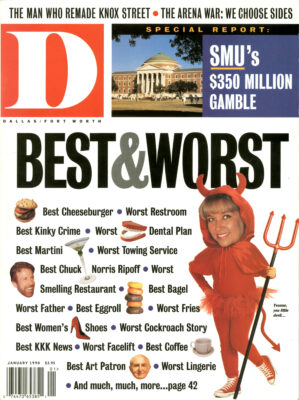URBAN ANALYST DAVID BlRCH HAS DEVELOPED four criteria for predicting which American cities will do well over the next two decades. In no particular order and with almost equal weight, he says they must have pleasant weather, access to the air, an entrepreneurial spirit, and an intellectual climate. In his rankings, Dallas came out high on the first two. fine on the third, but low on the fourth.
Dallas/Fort Worth has plenty of educational institutions: SMU, TCU, UT Dallas, UT Arlington, the University of Dallas, the University of North Texas. But while each may have qualities to recommend it in specific areas, none has become a centrifugal force for attracting talent, fostering ideas, or stoking the kind of internal combustion that generates intellectual heat. We need that kind of heat if our region is to be a competitive force in (he world economy. Think what Harvard. MIT. and Boston University have meant to Boston, what Stanford has meant to Silicon Valley, or-closer to home-what UT has meant to Austin and its booming high-tech economy. In the fostering of ideas and of the kind of people who are comfortable in the world of ideas. Dallas is far behind.
The fault, to my mind, lies with an ethos in this city that has valued training more than education. That narrow encompassing of a university’s purpose has been provincialism at its worst. And today it is worse than provincial, it isn’t even practical. One can be narrowly trained to program a certain language for the computer, for example, but only a broad mind can make it write music, or adapt it to translate languages, or use il to make causal connections, because only a broad mind knows music and languages and causal connections. The future is not narrow; it is unbelievably expansive. And only one thing about it is certain: In the future, the marketplace of ideas will be the only marketplace that matters.
SMU now faces a once-in-a-lifetime opportunity to be our city’s dominant player in that marketplace of ideas. In the past, the university seemed to operate in its own litlle world, unconcerned about the thrust of the great city that surrounded it. But under its new administration, SMU has launched initiatives designed to make it a forceful presence. For a start, its aggressive capital campaign-the largest single private fund-raising campaign in Dallas history-has emphatically reminded the city’s business, civic, and charitable communities that SMU exists. Moreover, the campaign has declared a new kind of private-public partnership. In effect. SMU has offered a quid pro quo: We’ll give you what you need if you give us the means. It’s a $350 million gamble, and from the results so far. Dallas seems to be willing to make it.
Bold moves are becoming commonplace under SMU president Gerald Turner, and this Special Report is only the latest of them. Several months ago. Turner invited D Magazine to do its own independent editorial assessment of its recent past, its present leadership, its strategic plan, its capital campaign, and its aspirations. SMI) has been such an important factor in so many of our readers’ lives (38 percent of its alumni live in Dallas) and has such potential for playing an important role in our city’s future that we agreed to the project. KPMG Peat Marwick. EDS. and Texas Instruments joined in to co-sponsor the effort with us.
We approached the project in the spirit of objectivity but. I must admit, with a certain amount of skepticism. SMU has touted new commitments to academic excellence several times over the last several decades, and ended up with litlle to show for the hoopla. Nor have SMU’s primary constituencies-its students, faculty, alumni, and our city’s own business community-ever seemed to expect anything more out of it than to be a nice, run-of-the-mill, upper-class degree factory. But that bar has been raised. The level of expectation we encountered among civic leaders we spoke with may be the most remarkable force driving higher education in Texas today. The new Dallas business community wants- demands-higher standards, top-flight talent, and a university that contributes the intellectual fuel to propel them forward. If SMU doesn’t provide it. they’11 go elsewhere to get it. There is no longer any feeling of accommodation in this town for second-best status.
Is SMU up to the challenge? Only a few months ago, I would have said no. because I would have doubted whether the people who supported it truly understood what a university is. or what it could be. But that isn’t the case anymore. One difference is Gerald Turner. He has turned SMU’s sights on the city, and he’s determined to show how a place of ideas can contribute to a place of action. But the second difference is the town itself, and in the long run, that’s more important. This is a city that has finally decided it needs a first-rate university. That’s the best news SMU could have–as il gambles on its one good chance to become one.
Related Articles

Hockey
The Stars and Golden Knights Meet Again
Catching the Stanley Cup champs early might work out for the Stars.
By Sean Shapiro

Basketball
Previewing Yet Another Mavs-Clippers Playoff Matchup
What is different about Clippers-Mavericks this time around? Kyrie and D.
By Iztok Franko

Restaurant Openings and Closings
Try the Whole Roast Pig at This Mexico City-Inspired New Taco Spot
Its founders may have a fine-dining pedigree working for Julian Barsotti, but Tacos El Metro is a casual spot with tacos, tortas, and killer beans.


